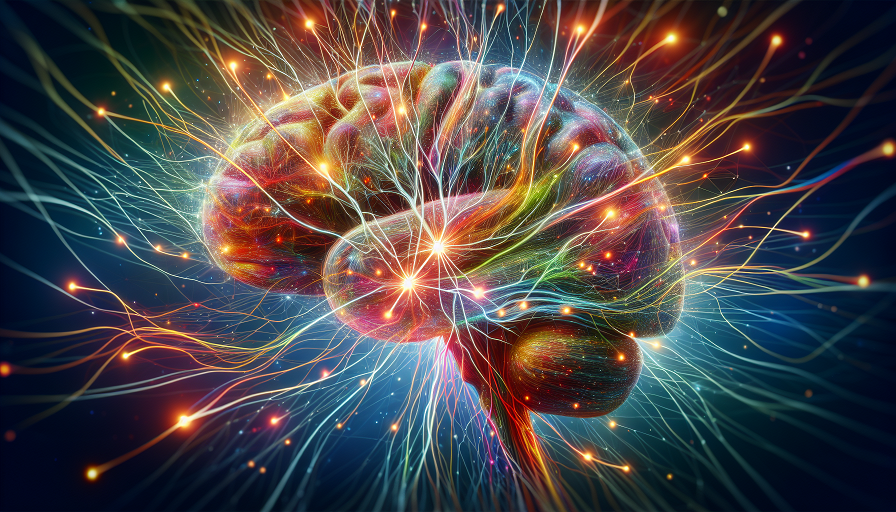
Yoga is often seen as a way to stretch and unwind, but its benefits stretch far beyond flexibility. This ancient practice engages both the mind and body, creating a unique synergy that supports brain health. Regular yoga can improve cognitive balance by enhancing brain connectivity and reducing the risks of cognitive decline.
The Connection Between Yoga and Brain Connectivity
Yoga is more than a series of poses; it’s a full-body experience that influences your brain at a deep level. Each movement, paired with mindful breathing, helps synchronize the different regions of your brain, promoting better communication and connectivity.
At the core of this process is the default mode network (DMN)—the brain’s autopilot system that’s active when you’re daydreaming, reflecting, or planning. Overactivity in the DMN has been linked to rumination and cognitive disorders like Alzheimer’s disease. Yoga helps quiet the DMN by engaging the prefrontal cortex, the area responsible for decision-making and focus. This creates a sense of mental clarity and balance.
Yoga also stimulates the hippocampus, a critical area for memory and learning. Movements like forward folds and gentle twists increase blood flow to the brain, delivering oxygen and nutrients that support the growth of new neurons. This process, known as neurogenesis, is essential for maintaining cognitive function as you age.
Breathing exercises, or pranayama, further enhance brain connectivity. Deep, controlled breaths activate the vagus nerve, which reduces stress and calms the nervous system. A calmer brain is a more efficient brain, better equipped to focus, process information, and solve problems.
If you’re new to yoga, here are some beginner-friendly practices to try:
- Cat-Cow Pose: Promotes spinal flexibility and increases circulation to the brain.
- Child’s Pose: Provides a gentle stretch and encourages relaxation.
- Alternate Nostril Breathing: Balances brain hemispheres and reduces mental clutter.
- Seated Forward Fold: Enhances blood flow to the brain and stretches the spine.
Research on Reduced Cognitive Decline Through Movement and Breath
Scientific studies have highlighted yoga’s ability to slow cognitive decline and enhance mental resilience.
A study published in Frontiers in Aging Neuroscience examined older adults who practiced yoga for 12 weeks. Participants showed improved attention, memory, and processing speed compared to those who didn’t practice yoga. Brain scans revealed increased gray matter in regions associated with cognitive control, suggesting that yoga promotes structural changes in the brain.
Another study in The Journal of Alzheimer’s Disease compared yoga to memory enhancement training in older adults with mild cognitive impairment (MCI). The yoga group demonstrated greater improvements in visuospatial memory—important for navigation and spatial awareness—along with reduced anxiety. Researchers noted that the combination of movement and mindfulness uniquely supported cognitive health.
Yoga’s effects aren’t limited to older adults. Research in Cognitive, Affective, & Behavioral Neuroscience showed that college students who practiced yoga three times a week for eight weeks performed better on tests measuring working memory and cognitive flexibility. This underscores yoga’s ability to benefit brains at all stages of life.
For those looking to incorporate yoga into their routine, consider these tips:
- Start Slow: Aim for 15–20 minutes of gentle yoga daily, focusing on breath and alignment.
- Join a Class: Group sessions provide guidance and accountability while fostering community.
- Combine with Meditation: Ending your yoga session with a few minutes of meditation amplifies its calming effects.
- Adapt to Your Needs: Choose styles that match your goals—restorative yoga for stress relief or vinyasa flow for a mental energy boost.
- Stay Consistent: Like any practice, yoga’s benefits grow with regularity.
Yoga offers a holistic approach to cognitive balance, blending movement and breath to nurture the brain. By improving connectivity and supporting resilience against decline, yoga provides a mental tune-up for every stage of life. Whether you’re mastering downward dog or simply practicing mindful breathing, this ancient practice has the power to sharpen your mind and elevate your overall well-being.

